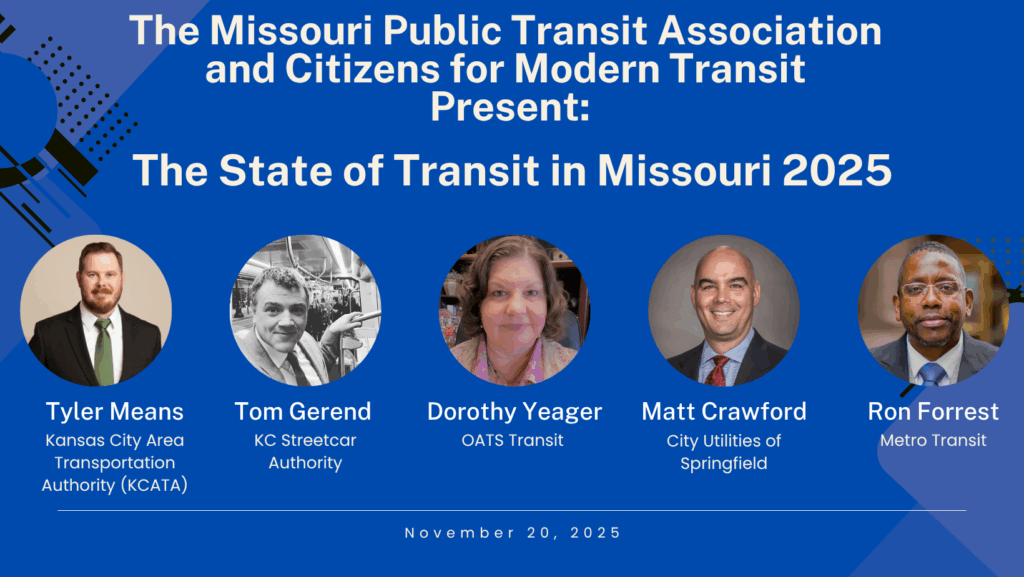Despite the profound influence of public transit on every county in the state of Missouri, Gov. Kehoe approved a 42% reduction in state investment for transit funding for SFY2026, and recent Department of Transportation proposals are suggesting the potential elimination of federal transit investment. This would have a far-reaching impact on transit accessibility statewide. In response, transit officials from across the state gathered to discuss this and other pertinent information during a “State of Public Transit in Missouri” online forum held by the Missouri Public Transit Association (MPTA) and Citizens for Modern Transit (CMT). The discussion can be viewed in its entirety below or by visiting YouTube here.
Attendees heard from leaders of the state’s largest, mid-level and rural transit providers. Panelists included Transit Director with City Utilities of Springfield Matt Crawford, Executive Director of the KC Streetcar Authority Tom Gerend, Chief Operating Officer of Metro Transit Ron Forrest, Chief Mobility and Strategy Officer for the Kansas City Area Transportation Authority (KCATA) Tyler Means, and Executive Director of OATS Transit Dorothy Yeager. The forum was moderated by CEO of CMT and Executive Director of the MPTA Kimberly Cella. Participants submitted questions through the Zoom chat and Q&A features.
Public transit is a critical part of Missouri’s transportation network, providing vital access to jobs, education, healthcare, essential goods and services, entertainment venues and anywhere else individuals need to go. Ridership continues to grow. Operational and capital program initiatives are making steady progress, transit-oriented development is moving forward, and local economies are benefiting from a statewide economic impact of $4.05 billion annually.
The KC Streetcar Authority recently celebrated the grand opening of its 3.5-mile Main Street extension, expanding the line from Union Station South to the University of Missouri–Kansas City (UMKC). The system has tripled ridership. KCATA’s service is connector oriented, ridership is increasing and back to pre-Covid numbers, performance is strong and additional service is in demand. Across the state in St. Louis, MetroBus and MetroLink ridership is up 6.5% and paratransit service ridership is up 37%. Metro Transit is adding 55 new light rail vehicles beginning in 2027 and is expanding MetroLink by 5.2 miles to MidAmerica St. Louis Airport in St. Clair County, Ill. City Utilities of Springfield recently wrapped a system study, Connect SFG, which resulted in route changes and a fare decrease. Demand for rides continues to grow.
OATS Transit, Southeast Missouri Transportation Service (SMTS) and other regional transit providers deliver rural transit service across the state, making Missouri the only state in the nation with rural public transit service in every county. This ensures unmatched access and connectivity, with employment being the leading trip purpose. A large portion of riders use the service for medical appointments and for grocery access by older adults. OATS Transit also employs more than 550 people throughout the state.
While transit is delivering for Missourians, state investment for transit took a 42% hit as part of Gov. Kehoe’s $300 million cuts on June 30. This dropped state investment from $11.7 million to $6.7 million – which is split among 30 transit providers. Per capita spending has now dropped from $1.89 to $1.08 and remains among the lowest in the nation. State funding is crucial as it provides the matching funds needed to secure federal funds for operations and capital programming. Further complicating funding levels for transit at the state level are proposals floated by USDOT to eliminate transit investment at the federal level.
This lack of federal funds for transit would have a devasting impact on service in rural Missouri, including the cessation of service in certain areas. In urban areas, vehicle fleets would operate beyond useful life, expansion projects would be put on hold and service levels would be reduced.
“If transit is important to you, now is not the time to be quiet,” stated Yeager of OATS Transit. “You have to make your voice heard in Jeff City to assure transit funding is sustained and in DC as Congress looks to write a new highway bill.”
Transit providers are encouraging Missourians to share their personal testimonies by calling and emailing legislators to ensure they understand the critical nature of state and federal funding for transit. As transit advocacy organizations, CMT and MPTA will be spearheading a wide range of efforts, including a virtual Missouri Transit Advocacy Workshop on Dec. 4 at 8:30 a.m., hosted by MPTA, showcasing how to utilize your voice to impact policy and investment.
“Transit has been a bipartisan supported effort for decades because of its impact and benefits,” noted Gerend of the KC Streetcar Authority “We need to continue to make that front and center. I have confidence in the benefits we deliver that are too important not to be included in a very meaningful way as it relates to federal transportation policies.”
Cella of MPTA and CMT added, “As our panelists underscored today, no matter if you are large urban transit agency or a smaller rural provider, the issues are the same. Transit is meeting the increased demand for quality transit service while facing rising costs and shrinking budgets. The message underscores the critical importance of state and federal investment to ensure transit continues to deliver for Missouri.”
